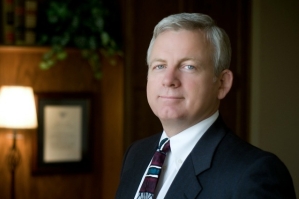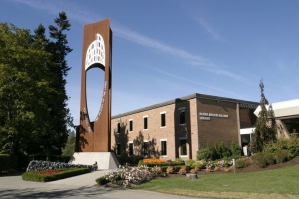
Not allowing law school graduates to work in Nova Scotia because they attended a university that prohibits same-sex relationships would be discriminatory, Bob Kuhn, the president of Trinity Western University told a group reviewing the issue in Nova Scotia last Tuesday.
"That's an audacious example of prejudice," Mr. Kuhn told the panel in his two-hour submission, according to the National Post
Canadian officials are considering excluding future graduates from Trinity Western University proposed law school that's slated to open in 2016 from practicing in all the provinces, because they attended a university that prohibits same-sex relations, and has the students and faculty sign a contract stating as much.

Kuhn is addressing Nova Scotia's Barrister Society in hopes of making a case for his school and it's graduates.
According to the the Canadian Press, the university, which bills itself as the largest, independent Christian liberal arts institution in Canada, asks its 3,600 students to sign a community covenant or agreement to preserve the way of life they would like to attain. Among its core values, the covenant states that sexual intimacy be "reserved for marriage between one man and one woman."
The private Christian liberal arts university in Langley, B.C. has plans to start a law school, and the Barrister's Panel in Nova Scotia is holding hearings to determine whether the student's should be allowed to article, and potentially practice in the province. This is the first of these panels, and in some ways, sets a precedent for the rest of Canada to follow.
In December, the Federation of Law Societies of Canada gave Trinity Western University preliminary approval for its law school program and said it was up to provincial law societies to decide whether to recognize degrees from the school.
According to The Province, many are afraid that if some provinces accept the degree and others don't, it will open the door to a breakdown in the national mobility, or reciprocity agreements among the provinces. Even so, many liberal lawyers and law professors have been putting pressure on their provincial barrister societies, or law societies to reject TWU graduates.
Barrister Societies, or Law Societies, or in Quebec, the Barreau du Quebec are bodies that decide which degrees are credentialed to have their graduates approach the bar and practice law in the various provinces.
A few law societies, including B.C., Ontario and Nova Scotia, have initiated processes to decide whether to grant accreditation to the TWU law school. Others, such as Alberta and Saskatchewan, have made public they intend to go along with the recommendation of the national Federation of Law Societies to approve the school in hopes of preserving national mobility agreements.
If these bodies decide not to credential the school, law degrees from the school could be worthless in those specific provinces.
Mr. Kuhn is a practicing Christian and has been a lawyer for more than three decades. The Canadian Press reports that the Trinity Western alumnus encouraged the panel to proceed "as lawyers, and not as personal representatives of any ideological viewpoints."
Mr. Kuhn said he has never found any suggestion that religious beliefs would prevent students from acting professionally and ethically in their duties as representatives of the court
He also said the matter raises the larger question of whether there is still meaningful freedom of religion in Canada.
Mr. Kuhn said the society doesn't have to agree with Trinity Western's covenant, but should "tolerate" it, out of a duty to objectivity and the law. He pointed to the school's record of academic excellence as meritable evidence that graduates could represent the law and the association appropriately.
The Barrister Society is scheduled to have a report and recommendation for its council to consider on April 25.







